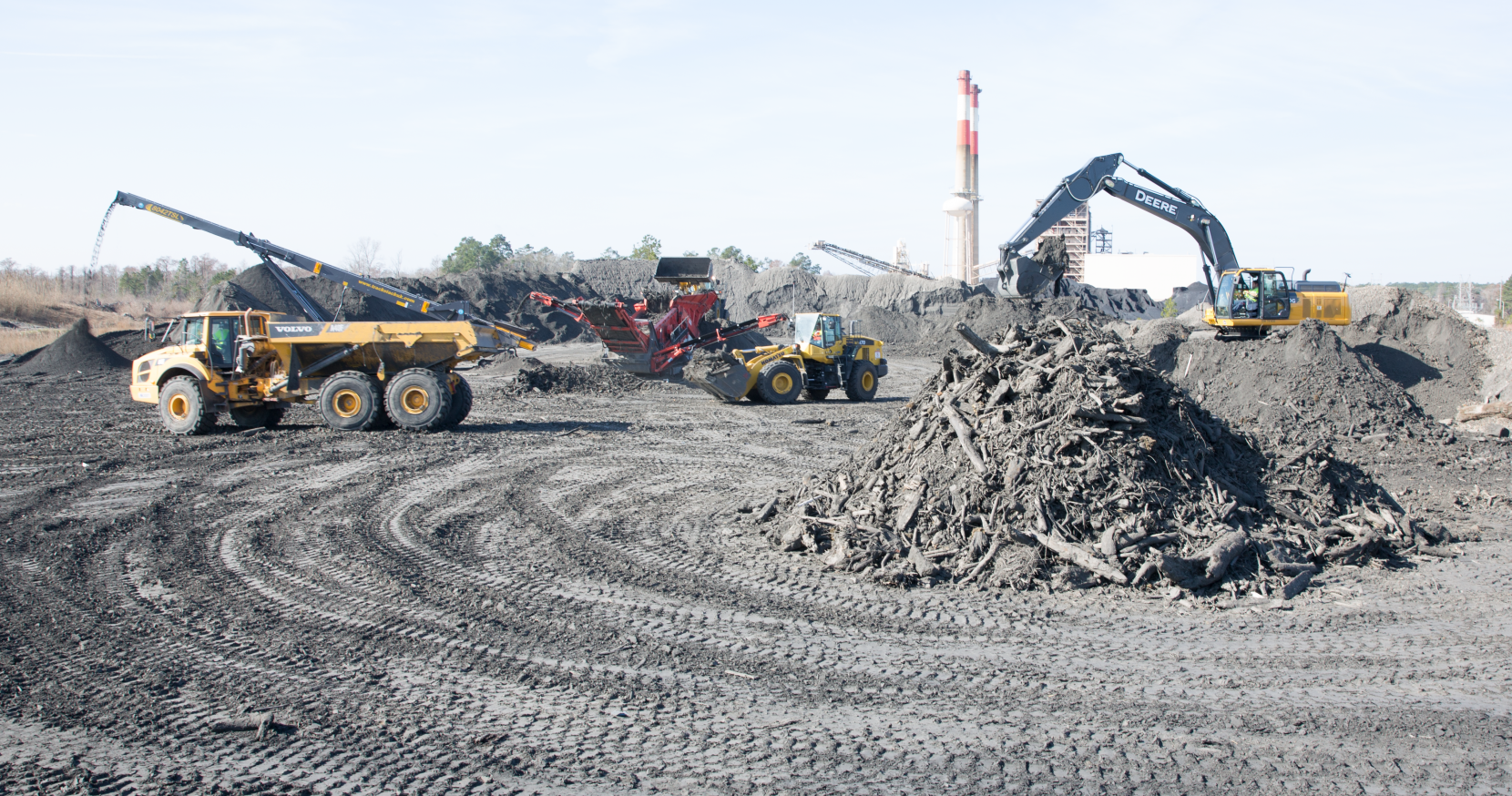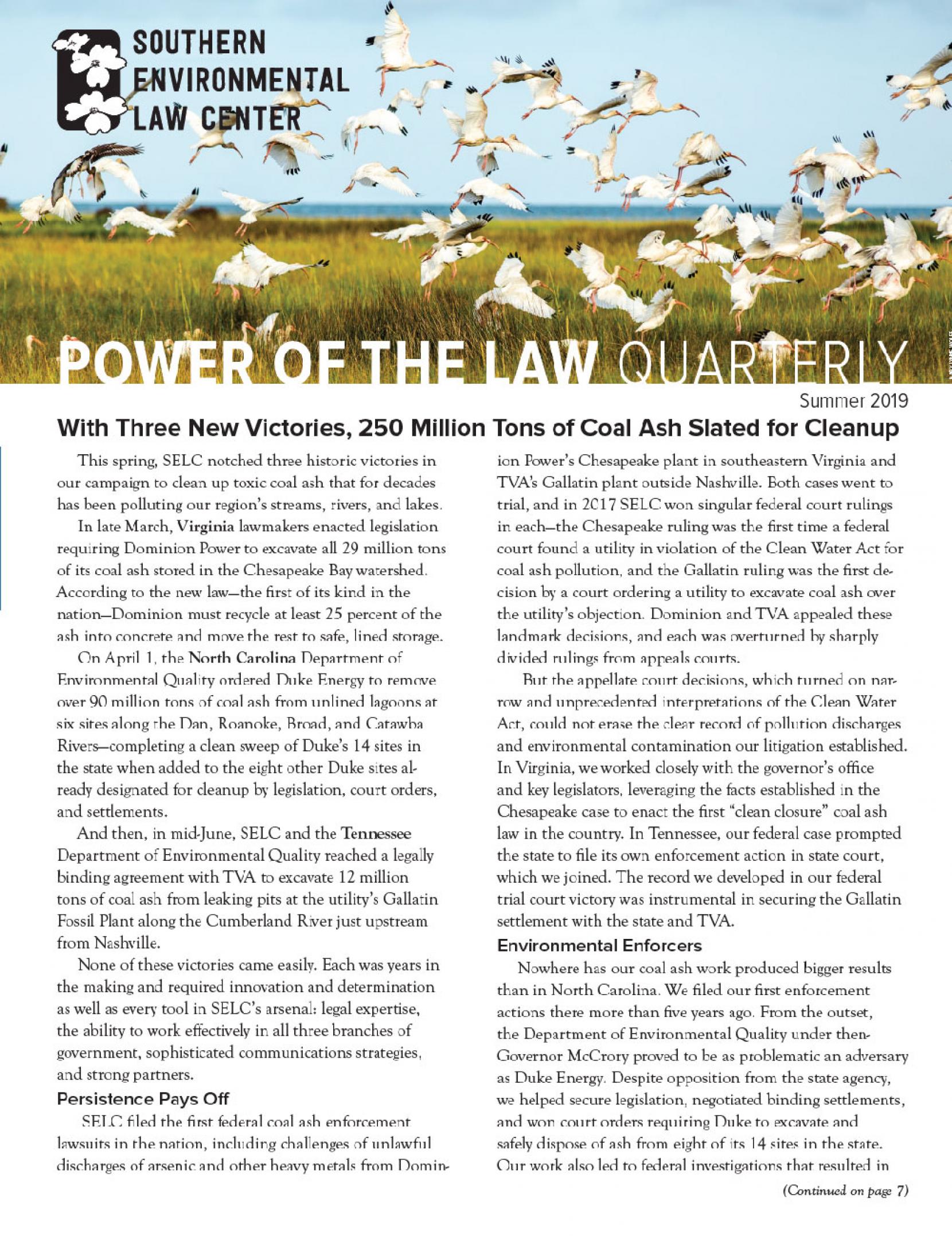Summer News, 2019
Browse the lastest SELC news, compiled for our Summer 2019 newsletter, below.
Our print newsletter has hit mailboxes every season for more than three decades. Now, to make it easily accessible for all, we're also presenting these stories online.
Enjoy our summer headlines.
With 3 new victories, 250 million tons of coal ash slated for cleanup
This spring, SELC notched three historic victories in our campaign to clean-up toxic coal ash that for decades has been polluting our region’s streams, rivers, and lakes, adding over 130 million tons to the 120 million tons of ash utilities are already required to excavate and move to dry, lined landfills or recycle into concrete.
In late March, Virginia lawmakers enacted historic legislation requiring Dominion Power to excavate all 29 million tons of its coal ash stored in the Chesapeake Bay watershed. According to the new law—the first of its kind in the nation—Dominion must recycle at least 25 percent of the ash into concrete and move the rest to safe, lined storage.
On April 1, the North Carolina Department of Environmental Quality ordered Duke Energy to remove over 90 million tons of coal ash from unlined lagoons at six sites along the Dan, Roanoke, Broad, and Catawba Rivers—completing a clean sweep of Duke’s 14 sites in the state when added to Duke’s eight other sites already designated for clean-up by legislation, court orders, and settlements.
And then in mid-June, SELC and the Tennessee Department of Environmental Quality reached a legally binding agreement with TVA to excavate 12 million tons of coal ash from leaking pits at the utility’s Gallatin Fossil Plant along the Cumberland River just a few miles upstream from Nashville.
None of these victories came easy. Each was years in the making and required every tool in SELC’s arsenal: legal expertise, innovation, the ability to work effectively in all three branches of government, sophisticated communications strategies, determination, and strong partners.


Click here to view the print version of SELC's summer newsletter.
Helping Union Hill Fight the Buckingham Compressor Station
SELC has banded together with a coalition of community activists and civil rights leaders to fight Dominion Energy’s plans to build the Buckingham County natural gas compressor station in the town of Union Hill, a tightly-knit community in central Virginia that was settled by former slaves in the years following the Civil War. Dominion Energy wants to build the compressor station in middle of this historic African-American community to keep natural gas flowing through its proposed Atlantic Coast Pipeline. Compressor stations are the dirtiest parts of pipeline infrastructure—they are loud, industrial facilities that run 24/7, emitting pollutants linked to skin rashes and respiratory, neurological, and gastrointestinal problems. The Union Hill community would bear the brunt of the noise, air pollution, and illness from the facility.
Dominion sited the Buckingham compressor station—as it has the rest of the Atlantic Coast Pipeline—without regard for what lies in or near its path. In February, SELC filed a lawsuit on behalf of Friends of Buckingham to challenge Dominion’s air pollution permit on the grounds that the compressor station would disproportionately harm the predominantly African-American community of Union Hill and because state regulators failed to consider less polluting alternatives or to study the best available pollution controls to protect the health and wellbeing of the nearby community. As SELC continues to work to ensure that the pipeline complies with all health and environmental safeguards, we also will fight to protect the communities that lie in the path of this unnecessary, expensive, and destructive boondoggle.
Trump administration feels the backlash on offshore drilling
Since day one, President Trump has been determined to open the Atlantic to offshore drilling despite widespread local opposition—but it’s getting harder to maintain that position.
In April, Georgia’s House of Representatives passed a resolution opposing offshore drilling, and U.S. Congressman Buddy Carter, who represents all of coastal Georgia, reversed position and asked for his state to be removed from the plan. In South Carolina, the state’s Senate voted 40-4 to ban infrastructure needed for offshore drilling and exploratory seismic blasting.
In the wake of this mounting bipartisan opposition, Interior Secretary David Bernhardt said the administration had “indefinitely delayed” the next version of the five-year leasing plan. Media reports suggest it may not appear until after the 2020 election, due in large part to significant opposition from Republicans in the Southeast. The delay was immediately hailed as “great news” by South Carolina Governor Henry McMaster, who vowed to “continue our efforts to protect our pristine coastline and invaluable tourism industry from the destructive threats of seismic testing and offshore drilling.”
The Trump administration nevertheless continues to push forward its oil-friendly policies. The government has announced it will proceed with seismic blasting permits in the Atlantic as well as rollbacks to drilling safety rules put in place following the 2010 Deepwater Horizon spill. SELC, joined by ten East Coast states, is challenging the seismic permits in federal court, and in February we asked for a preliminary injunction to block the authorizations to begin air gun blasting. As we await that decision, we have also filed a federal lawsuit in June to stop the administration from weakening the drilling safety reforms established to prevent another offshore drilling tragedy.
The South speaks up for clean water
SELC is leading efforts to counter attacks on the nation’s bedrock clean water safeguards. In August 2018, we won a court order that blocked EPA from suspending the prior administration’s Clean Water Rule, which clarified the scope of waters protected by the Clean Water Act in response to questions raised by earlier Supreme Court decisions. Now, the agency has proposed a new rule that would eliminate those clean water protections for half the nation’s waters, including many of the streams, rivers, lakes, and wetlands that southerners rely on for clean drinking water, fishing, swimming, and paddling.
During the public comment period for the new rule, we launched the ProtectSouthernWaters.org campaign and worked with dozens of riverkeepers and partner groups to raise awareness about what the proposed changes would mean for our region and to generate comments opposing it. The administration is still counting the submitted comments, but it looks like the final tally will be well over one million nationwide—with our efforts accounting for more than 20,000 comments. Drawing on 30 years of Clean Water act enforcement expertise, SELC also submitted an exhaustive comment letter on behalf of 80 partners, exposing the proposal’s legal and scientific flaws.
The agencies cannot act until they consider all comments submitted, which should take months. If they finalize the flawed rule as proposed, we stand ready to challenge it in federal court.

Keeping poison gas out of columbus county
SELC stopped a log export company from locating one of the nation’s largest sources of methyl bromide air pollution in Delco, North Carolina. This colorless, odorless gas depletes the ozone layer and can cause central nervous system damage. Still, the Malec Brothers company planned to spew 140 tons of the poison gas per year from a facility less than a mile from a middle school, and the state was ready to go along. SELC identified legal problems in the air pollution permit and informed the local community about the health risks. As a result, more than 600 residents voiced public opposition, and over 1,000 submitted written comments. Soon after, North Carolina declared methyl bromide should be strictly regulated, and Malec Brothers dropped plans to use the gas in Columbus County.
Protecting Beaches from Terminal Groins
As sea levels rise, property owners are seeking ever more desperate measures to protect vulnerable coastal investments. To stop shoreline erosion, some have proposed building rock-pile structures (called terminal groins) hundreds of feet into the ocean from barrier islands. Terminal groins, however, actually cause further beach erosion, disrupt wildlife habitat, and are obscenely expensive. After two years of alerting the community to these pitfalls, SELC saw a big step forward in our efforts to oppose these structures when Holden Beach became the first town to withdraw its federal application to construct a terminal groin. A similar project was voted down by homeowners on Figure Eight Island. Now SELC has filed suit to stop a terminal groin at Ocean Isle Beach. If successful, this challenge could impose serious legal barriers to these destructive projects going forward.

Loan Fund Offers Sensible Approach to Flooding
Each of the last four years, South Carolina has experienced devastating flooding events. Development in low lying areas makes flooding worse because concrete doesn’t absorb flood waters like wetlands and other natural features do—and in massive storms, the same properties are often hit over and over again. After a flood, residents often want to sell and move to higher ground but cannot afford to do so. SELC drafted legislation to create a low-interest loan fund to help communities purchase repeatedly flooded properties, move homeowners out of flood-prone areas, and restore floodplains to open space. The bill passed the state Senate in 2019, and we are building support in the House ahead of the 2020 session.
Bad Factory Farm Bill Thwarted in Legislature
Industrial livestock farms do not make great neighbors when animal waste pollutes nearby water and exposes nearby communities to noxious odors. Today, Georgians can file lawsuits when new facilities move in and make living conditions oppressive. But an eleventh-hour bill was proposed in the state legislature to drastically limit the rights of rural property owners, businesses, and schools by declaring any agricultural facility in operation for at least one year cannot be considered a nuisance. For an industrial hog farm, the nuisance may not be apparent for a year or more, leaving nearby communities with no legal recourse. SELC partnered with the Georgia Water Coalition and numerous rural voices to oppose the bill, and we stopped it with the help of a bipartisan group of senators.
Regulators Clear a Path for Efficiency
For many years, Virginia regulators have approached new energy efficiency programs with skepticism. Doubting the basic calculus that using less energy to perform the same household or commercial tasks could save ratepayers money, they repeatedly shaved time and funding off of Dominion Energy’s efficiency proposals—and the utility has been all too happy to go along. As a result, Virginia has lagged behind other states in the cleanest energy resource of all. But in May, regulators approved $226 million in efficiency spending by Dominion over five years, for the first time blessing an efficiency proposal at the full dollar amount and for the full duration. This shift places the ball squarely in Dominion’s court to demonstrate commitment to implementing meaningful programs over the next five years.
Additional newsletter headlines:
-
Defending the right to go solar
-
Jeff Gleason takes over
-
Leveraging SELC's place-based forest expertise
-
Bridge into the sea
-
Helping Union Hill fight the Buckingham compressor station
-
Under pressure, TVA to clean up Memphis coal ash
-
SELC takes fair energy demands to Georgia regulators
-
Ending decades of wastewater pollution

